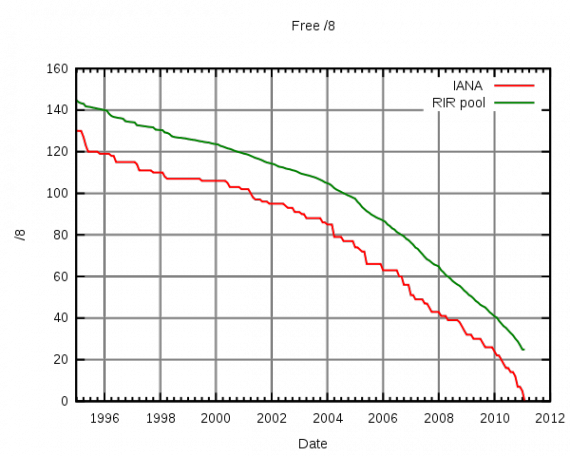IPv4 (Internet Protocol version 4) is the Internet address protocol that has been used for years, but its limits are about to reached. IPv4 was founded back in the early 80’s, when not that many computers were around. It was thought to last forever, considering it has nearly 4.3 billion addresses. The founders didn’t expect the IP usage to become so great.
 Nowadays, anything that connects to the Internet has an IP address, whether it’s your computer, phone, or iPad. Nevertheless, those 4.3 billion addresses are starting to run out. Early Thursday morning, ICANN (Internet Corporation for Assigned Names and Numbers) announced that they have given out the last block of IPv4 addresses to the five Regional Internet Registries. The remaining addresses given to the Registries could be assigned as early as 2012.
Nowadays, anything that connects to the Internet has an IP address, whether it’s your computer, phone, or iPad. Nevertheless, those 4.3 billion addresses are starting to run out. Early Thursday morning, ICANN (Internet Corporation for Assigned Names and Numbers) announced that they have given out the last block of IPv4 addresses to the five Regional Internet Registries. The remaining addresses given to the Registries could be assigned as early as 2012.
Now don’t get in a panic, there is a different route. Without getting too technical, there’s the updated version of the Internet Protocol that has been used for years, IPv6. IPv6 is nothing new to the Internet world; it has just been a matter of companies adopting this version. To get a good idea of how long it’s been available, Microsoft Windows 2000 supported IPv6.
 IPv4 uses a 32-bit address, while IPv6 uses a 128-bit address. Since the numbers grow exponentially, you’ll have 340 trillion trillion trillion addresses; a number must people can’t even get their mind around.
IPv4 uses a 32-bit address, while IPv6 uses a 128-bit address. Since the numbers grow exponentially, you’ll have 340 trillion trillion trillion addresses; a number must people can’t even get their mind around.
Example IPv4 address: 192.168.1.100
Example IPv6 address: 2001:0DB8:AC10:FE01:0000:0000:0000:0000
Google and others have also organized World IPv6 Day for June 8, 2011. Their intention is to help expand knowledge and usage of IPv6.
What does this mean for the average computer user? Most likely nothing will change with you at all. You won’t notice a difference between the two versions of IP, except wonder what the strange IP address your computer or Internet connected device has.
Source: Google Blog



